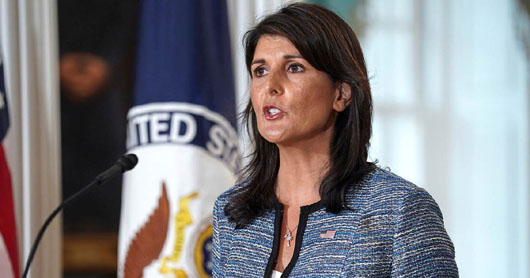by WorldTribune Staff, June 20, 2018
The United States on June 19 said it withdrew from the UN Human Rights Council after an unsuccessful effort to reform the council.

“When a so-called Human Rights Council cannot bring itself to address the massive abuses in Venezuela and Iran, and it welcomes the Democratic Republic of Congo as a new member, the council ceases to be worthy of its name,” U.S. Ambassador to the UN Nikki Haley said.
Haley said the “self-serving” council “in fact, damages the cause of human rights.”
U.S. President Donald Trump said at the UN General Assembly in September 2017: “It is a massive source of embarrassment to the United Nations that some governments with egregious human rights records sit on the Human Rights Council.”
Haley, on June 19, said “it is now clear that our call for reform was not heeded. Human rights abusers continue to serve on and be elected to the council.”
The election of Democratic Republic of Congo as a council member infuriated the U.S. “The DRC is widely known to have one of the worst human rights records in the world,” Haley said. “Even as it was being elected to membership in the Human Rights Council, mass graves continued to be discovered in the Congo.”
The U.S., Haley said, sought “to stop the council from protecting the world’s worst human rights abusers. What happened? The council would not even have a meeting on the human rights conditions in Venezuela. Why? Because Venezuela is a member of the Human Rights Council, as is Cuba, as is China.”
The council also failed to respond in December and January “when the Iranian regime killed and arrested hundreds of citizens simply for expressing their views,” Haley said.
Haley also called out the council for what she said was its “chronic bias against Israel. Last year, the United States made it clear that we would not accept the continued existence of agenda item seven, which singles out Israel in a way that no other country is singled out. Earlier this year, as it has in previous years, the Human Rights Council passed five resolutions against Israel – more than the number passed against North Korea, Iran, and Syria combined. This disproportionate focus and unending hostility towards Israel is clear proof that the council is motivated by political bias, not by human rights.”
Many countries “strongly resist any effort to expose their abusive practices,” Haley said. “In fact, that’s why many of them run for a seat on the Human Rights Council in the first place: to protect themselves from scrutiny. When we made it clear we would strongly pursue council reform, these countries came out of the woodwork to oppose it. Russia, China, Cuba, and Egypt all attempted to undermine our reform efforts this past year.”
Haley also expressed the U.S.’s frustration with several countries on the Human Rights Council “who do share our values. Many of them strongly urged us to remain engaged in the council. They are embarrassed by the obsessive mistreatment of Israel. They share our alarm with the hypocrisy of countries like Cuba, Venezuela, Democratic Republic of Congo, and others serving on the council.”
“Ultimately, however, many of these likeminded countries were unwilling to seriously challenge the status quo. We gave them opportunity after opportunity and many months of consultations, and yet they would not take a stand unless it was behind closed doors. Some even admittedly were fine with the blatant flaws of the council as long as they could pursue their own narrow agenda within the current structure.”
Subscribe to Geostrategy-Direct __________ Support Free Press Foundation
